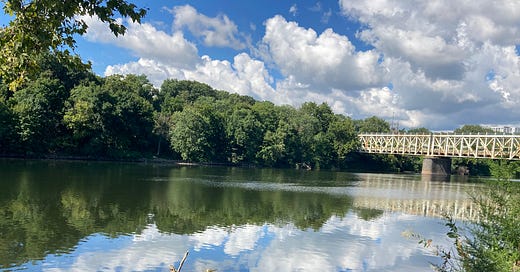Snow is already piling up here in the land of the Odawa, and I am feeling the need to hunker down and hibernate for winter. It is the last day of November—Native American Heritage Month—and before it’s gone I want to spend some time here on the importance of understanding history as we think about how to move forward in an uncertain future.
Some say we should just move on, forget what has been. But it is the job of the memoirist to dig into one’s past, unbury what’s been hidden—our shame, our secrets, our pain. Telling the truth is hard because it requires us to be honest about who we are and what we have done (or not done).
Over the past decade, I have embarked on this journey of unburying my own history, but I realized early on that this wouldn’t be enough. That my experience is impacted by the experiences of those who came before me. We call it generational trauma and generational cycles of abuse.
I had to dig into my family’s past, and even further—the past of my long-forgotten ancestors, who included refugees (French Hugenot) and colonizers (Mayflower Pilgrim). They were both abused and abusers, and the line between them is too hazy to parse now.
All of us here in America are on land that has borne trauma and abuse. Recently I took a ghost tour of downtown Grand Rapids, and the tour guide spoke to how white colonizers destroyed most of the burial mounds that once surrounded the river, using them as landfill to build their city on top of. The places I spend my time—working, drinking coffee with friends, going to the theater—have a deep and complex history that includes genocide, removal, and more recently, redlining. I cannot escape this paradox.
Much of what I’ve written has been deconstructing Christian Patriarchy, but I believe that we only go halfway with this work if we fail to decolonize our minds and work for a future that does not ignore past wrongs but seeks to reckon with them, to right them as much as we can. I was not able to heal from personal trauma without facing what had happened in my past, and our country will be unable to heal unless we do the same.
Below, I have a few reading recommendations to celebrate Native American authors, as well as some places to donate to help right our wrongs. And then, below the paywall, I’m sharing the chapter in Rift that, to me, is central to my project.
Books by Native American authors:
Braiding Sweetgrass: Indigenous Wisdom, Scientific Knowledge and the Teachings of Plants by Robin Wall Kimmerer (one of my favorite nonfiction books of all time)
The Serviceberry: Abundance and Reciprocity in the Natural World by Robin Wall Kimmerer (her new book, which just came out and which I just bought at Brilliant Books in Traverse City)
Walking the Ojibwe Path: A Memoir in Letters to Joshua by Richard Wagamese (I’m reading this right now)
Becoming Rooted: One Hundred Days of Reconnecting with Sacred Earth by Randy Woodley
Native: Identity, Belonging, and Rediscovering God by Kaitlin B. Curtice
The Sentence by Louise Erdrich (this was my latest read of hers, but really all of her work is incredible)
Here’s a more extensive list from Flyleaf Books that makes me want to stop writing this and get back to reading: More Recommendations
Places to donate:
Below are the organizations I committed to donating to with part of the proceeds of my book, but I encourage you to research Indigenous peoples in your area and consider supporting them. This map can help.
“Origins,” an excerpt from Rift: A Memoir of Breaking Away from Christian Patriarchy
If you have come to help me, you are wasting your time. If you have come because your liberation is bound up with mine, then let us work together.
2022. I’m driving from my older brother’s house in Pottstown to East Falls, and the landscape is hauntingly familiar: rolling hills embroidered with the heavy trees of August, winding roads and then the interstate into the city. But once I reach Philadelphia, I am an outsider. The waitress who served lunch to me and my mother yesterday said I didn’t look like I was from Pennsylvania. I haven’t lived here in nearly twenty-five years, and I wonder where I do look like I’m from. Not here, I guess…
Keep reading with a 7-day free trial
Subscribe to My Blue Peninsula to keep reading this post and get 7 days of free access to the full post archives.




